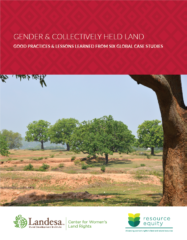
Many studies have shown the benefits to women of secure rights to land: when their rights are secure, their status in the community and within the household can increase, their income can increase, and they and their families are less likely to be underweight or malnourished. It is crucial, therefore, that women be consulted and empowered in order to ensure that they benefit from collective land tenure reforms.
While efforts to address gender in land tenure reforms are increasing, work to improve tenure security of collective land is relatively new. Largely understudied is the intersection between gender and collective tenure security reforms. Land is a critical asset for women and men, and land held in collective tenure can be particularly important for women because their livelihoods often depend upon it. In the rush to provide secure land tenure for communities there is a risk that women’s rights will not be documented or secured, thus weakening their rights to the collective land.
This report seeks to answer the question:
Where collective tenure arrangements are either being formalized or supported for the sake of securing the community’s rights to land, what steps are required to strengthen women’s land rights in the process?
This report synthesizes findings from six case studies – from China, Ghana, India, the Kyrgyz Republic, Namibia, and Peru – that assess interventions to strengthen collective tenure and ensure that both women and men benefit from the improved land tenure security.
Read the report here.
